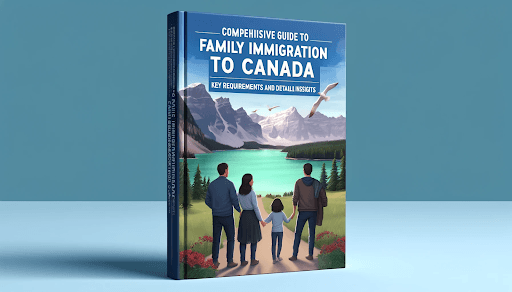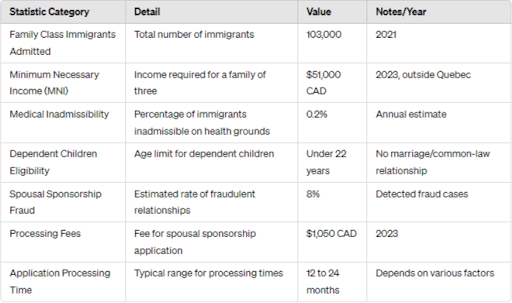Comprehensive Guide to Family Immigration to Canada: Key Requirements and Detailed Insights
- May 29, 2024
- 5 min

Immigrating to Canada with a family involves navigating a complex set of requirements designed to ensure that immigrants and Canadian society mutually benefit from the process. This detailed exploration of the five major requirements for family immigration to Canada includes specific statistics, guidelines, and insights to help understand the process thoroughly.
1.Eligibility to Sponsor
One of the initial steps in family immigration is establishing the eligibility of the sponsor. A sponsor must be a Canadian citizen or a permanent resident of Canada and must be at least 18 years old. The responsibility of the sponsor is significant, as they must provide financial support to the sponsored family members for a period that varies depending on the relationship.
Statistics and Details:
According to Immigration, Refugees and Citizenship Canada (IRCC), in the year 2021, about 103,000 family class immigrants were admitted into Canada. The sponsors must ensure they are not under any removal order, incarcerated, or currently bankrupt. Moreover, they should not be in receipt of social assistance for reasons other than a disability.
Challenges and Responsibilities:
Sponsors must sign an undertaking promising to provide for the basic needs of their sponsored family members. This commitment period is 3 years for a spouse or common-law partner, and up to 20 years for a parent or grandparent.
2.Minimum Necessary Income (MNI)
The financial robustness of the sponsor is scrutinized through the Minimum Necessary Income requirement, which varies by the size of the sponsor’s family plus the number of persons being sponsored.
Statistics and Details:
For instance, as of 2023, the MNI required for a sponsor residing outside of Quebec who wishes to sponsor a spouse and two children must demonstrate an income of approximately $51,000 CAD. This income threshold is adjusted annually to reflect economic conditions and cost of living changes.
Implications:
This requirement is intended to ensure that new immigrants do not need to rely on Canadian social assistance programs, thereby fostering an economically stable environment for the newcomer family.
3.Health and Background Checks
All potential immigrants under the family class must undergo comprehensive medical exams and security background checks. These measures are essential to protect public health and safety in Canada.
Statistics and Details:
Each year, about 0.2% of prospective immigrants are found inadmissible on medical grounds, often due to conditions that might pose excessive demand on Canada’s health or social services. Background checks involve screening for criminal activity, involvement in human rights violations, or any security risks to Canada.
Procedure:
The medical exam must be performed by a doctor approved by the Canadian government, often referred to as a panel physician. The results are then reviewed by IRCC to determine medical admissibility.
4.Age and Relationship
The relationship between the sponsor and the sponsored person must qualify under the family class immigration category, which includes spouses, common-law partners, dependent children, parents, and grandparents.
Statistics and Details:
For a child to be considered dependent, they must be under the age of 22 and not married or in a common-law relationship. However, there are exceptions for children older than 22 if they are dependent due to a physical or mental condition.
Cultural Considerations:
Canada recognizes both same-sex and opposite-sex relationships equally under its immigration laws, reflecting the country's commitment to diversity and inclusion.
5.Proof of Relationship
Providing convincing proof of relationship is crucial and often involves detailed documentation. This is a critical step designed to prevent immigration fraud.
Statistics and Details:
The rate of detected spousal sponsorship fraud, where relationships are misrepresented for immigration benefits, is estimated at about 8%. This has led to stringent checks and balances in the evaluation process.
Documentation Required:
Typical documents include marriage certificates, birth certificates for children, and proof of cohabitation for common-law relationships. Photographs, joint bank accounts, and other evidence of a shared life can also be necessary.
Additional Considerations
Financial Commitments:
Sponsoring a family member involves certain fees, including processing fees, which were approximately $1,050 CAD for a spousal sponsorship application as of 2023. These fees are non-refundable, even if the application is not approved.
Processing Times:
The processing time for family immigration applications can vary widely, typically ranging from 12 to 24 months. This duration depends on several factors including the country of origin, the completeness of the application, and current processing volumes at IRCC.
Conclusion
The family immigration process to Canada is designed to support family reunification in a manner that aligns with the country’s social and economic policies. Adhering to the detailed requirements set by the IRCC is crucial for a successful application. This comprehensive approach ensures that families can reunite in Canada under conditions that promote their success and integration into Canadian society, while safeguarding the interests and security of the nation.
